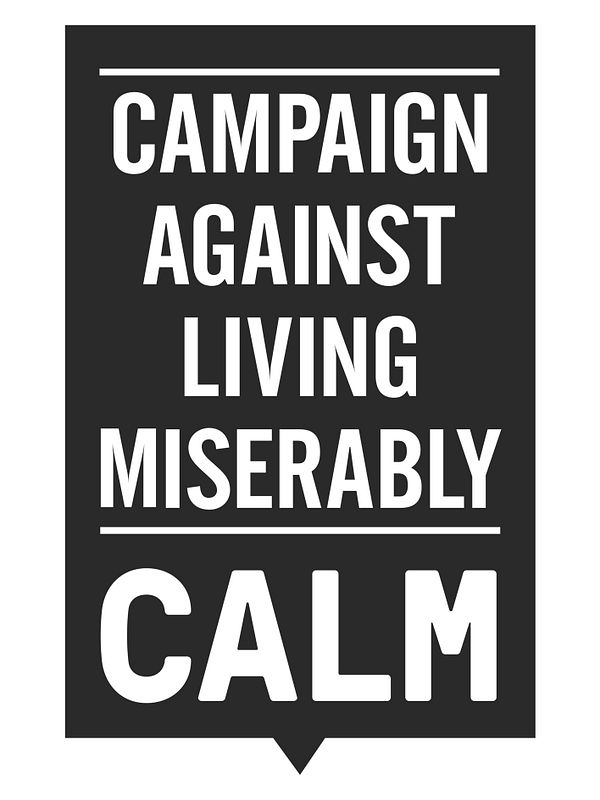Press release -
CALM's Response To Germanwings Tragedy
The recent tragedy in which, according to the evidence available so far suggests, Andreas Lubitz co-pilot of a Germanwings flight from Barcelona to Dusseldorf deliberately flew his Airbus A320 into the Alps, appears to have been an act of pre-meditated mass murder.
In the search for reasons why someone should commit such an appalling act, reports are currently appearing on the BBC and other media that Lubitz hid details of an illness.
It is also reported that German prosecutors say a German hospital confirmed Lubitz had been a recent patient but denied reports he had been treated for depression. Nevertheless, many media reports have linked this tragedy to male depression and suicide.
Such assumptions need to be put into perspective.
Being depressed doesn’t make you unfit for work, nor does it make you a killer. Whilst depression may be a precursor to suicide, the majority of those with depression continue to function and lead responsible lives. The reality is that the overwhelming majority of people who die by suicidedon’t harm anyone. Indeed, often they take their life because, as they see it, they want to prevent further hurt to others.
There were 6,233 probable suicides in the UK in 2013 of which 78% or 4,858, were male. Suicide is the single biggest killer of men aged 20-45 in the UK. By contrast, female suicide rates are declining - both the numbers and rates of female suicides have all but halved since the 1980s.
In order to understand why so many men take their lives every year, male suicide prevention charity the Campaign Against Living Miserably (CALM) recently commissioned wide-ranging research about men from independent specialists, Public Knowledge, which aimed to test assumptions about the particular expectations and pressures that men face and find out how these expectations and pressures differ between genders.
The research found that while both men (50 per cent) and women (59 per cent) are likely to have experienced depression at some time, it is clear that around half of these men didn’t feel able to talk about their problems or ‘burden others’. The research showed that not only do men feel they cannot talk about their problems and resulting depression but astoundingly, less than one in 10 men thought that employers, government and unions were taking their specific needs into account.
Jane Powell, CEO, CALM emphasises: “The irony is that those who are most likely to suffer huge stress and trauma are those who hold the lives of others in their hands, whether they are pilots or policemen, surgeons or soldiers. And yet they face the lose-lose position of being more vulnerable to mental ill-health because of the nature of their job, and feel less able to ask for help, or admit they are doing so, because of their job. The expectation is frequently that these are roles for 'real' men; men who are fearless under fire, cool, in control, dependable, fire-proof. To be seen to have been mentally unwell would, by definition, exclude you thereafter from holding such a job. So they remain silent and don’t ask for help. And if they kill anyone, it's themselves."
A question asked time and again after a suicide is why didn’t anyone know or suspect something was wrong? But as a culture, our response to men who 'fail' in any way is almost by default to challenge their masculinity, to suggest such men need to ‘grow a pair’. CALM believes that this research reflects the fact that those who become depressed or suffer other psychological problems may also develop a real, and not unfounded fear, that they may lose their job, and all that involves in terms of money, status and self-respect.
This leads to problems being bottled up, perspective is then lost and the shame of being mentally unwell becomes toxic. The greater the need for external help, the harder it becomes to seek it. And even those who do seek it often do so in secret, afraid of how they will be judged. Suicide becomes in the mind of someone who has ‘lost his mind’ the only rational way out.
Powell says “We can’t afford to casually equate depression with murder, or suggest that we cannot trust those with depression. To do so will only reinforce our problems, will make many men out there fearful of admitting to needing help. Any of us can potentially experience a situation where we contemplate suicide, whether for a nano-second or for much longer. Our minds are all that we have that link us to the world around us. Anyone, male or female, should feel able to ask for help to keep that link healthy without feeling ashamed. To feel that you can’t ask for help would be terrifying."
Related links
Topics
- Mental Health
Categories
- calm
- suicide prevention
- mental health
- suicide
- male suicide
- gender
- male mental health
- men's health
NOTES TO EDITORS
Contact:
Jane Powell, CEO, CALM
0203 697 9331
About CALM
CALM, the campaign against living miserably, is an award-winning charity dedicated to preventing male suicide in the UK via
- a free, confidential helpline and webchat service taking over 40,000 calls a year on 0800 585858 (national) 0808 802 5858 (London) open 7 days a week, 5pm – midnight.
- www.thecalmzone.net - a site where men can hear about other mens lives as well as help and information
- CALMzine, our award-winning quarterly men's lifestyle magazine.
In 2013 in England & Wales, there were 5,140 suicides, 78% of which were male (4,020)
CALM is reg charity no's. 1110621 and SC044347
